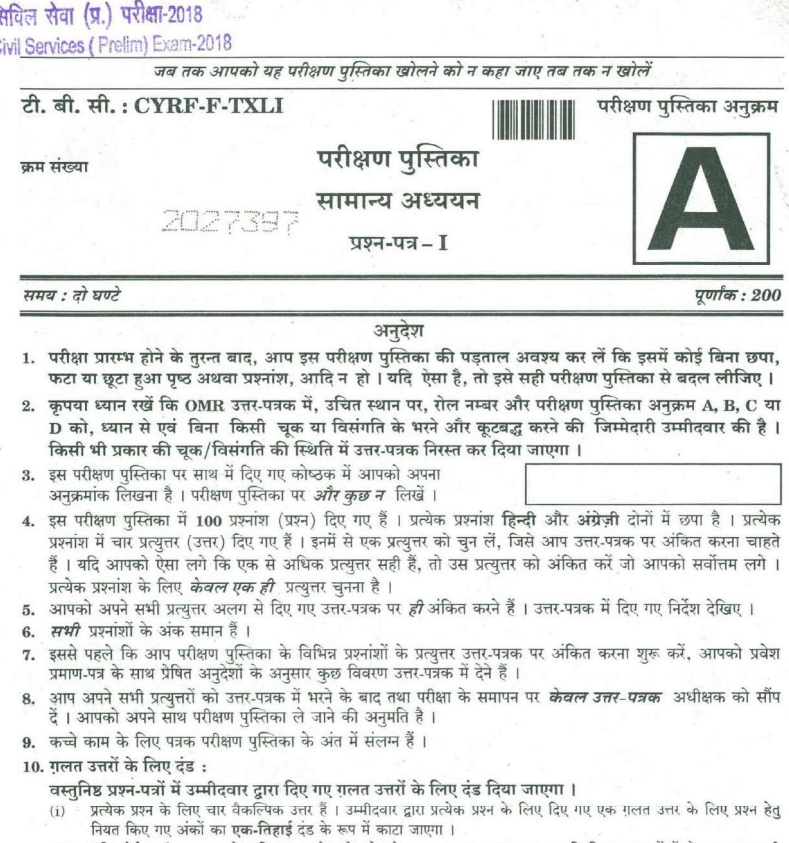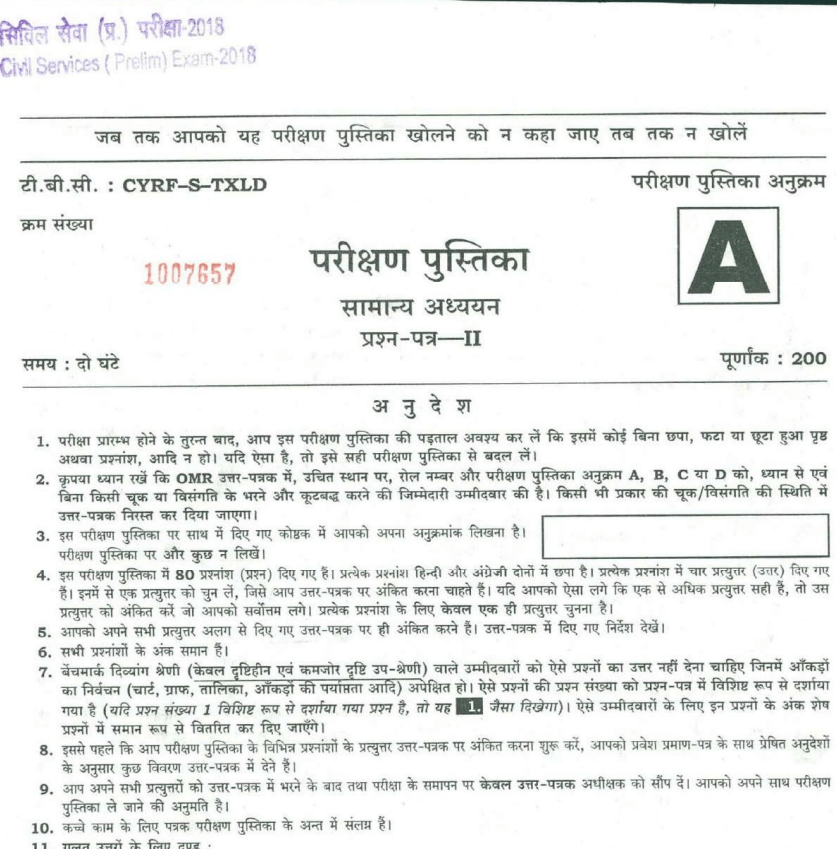The Prelims exams are quite important as the marks obtained are taken into account for merit calculation.To practice for the upcoming IAS Mains Exam, candidates must start practicing by downloading the Prelims Question paper 2018 from the links given in the blog below.
Prelims are the qualifying stage for the UPSC Civil Service Mains Exam. Only candidates who clear the Prelims Exam are eligible to appear for the UPSC Civil Service Mains Exam. UPSC Prelims exam has 2 General Studies papers – GS 1 and GS 2/CSAT (Civil Service Aptitude Test)
Overview: Prelims Question paper 2018
The Prelims Question paper 2018 stands as a good resource for aspirants aiming to crack UPSC. Covering an extensive range of subjects, including General Studies, Optional Subjects, and the Essay paper, it guides candidates through the format of the UPSC exam. This blog becomes a roadmap, not only showing structure but providing a glimpse into the examiner’s expectations and evaluation criteria.
| Particulars | Details |
| Date of Notification | 07/02/2018 |
| Date of Commencement of Examination | 03/06/2018 |
| Duration of Examination | One Day |
| Last Date for Receipt of Applications | 06/03/2018 – 6:00pm |
| Date of Upload | 07/02/2018 |
Download solved question paper: Prelims Question paper 2018


| PDF Download | |||
| Paper Title | Year of Exam | Paper with solution | |
|---|---|---|---|
| GS Paper-1, GS Paper-2 | 2018 | Download @20Rs | |
Syllabus: Prelims Question paper 2018
After familiarizing yourself with the Question paper 2018 and Civil Services Exam Syllabus, it’s crucial to delve into the specifics of each paper. Here’s a breakdown of the UPSC CSE 2024 General Studies Paper 1 and General Studies Paper 2 (CSAT) syllabus:
General Studies Paper 1 Syllabus:
- Current events of national and international importance
- History of India and Indian national movement
- Indian and world geography (Physical, social, economic geography of India and the world)
- Indian polity and governance (Constitution, political system, panchayati raj, public policy, rights issues, etc.)
- Economic and social development (Sustainable development, poverty, inclusion, demographics, social sector initiatives, etc.)
- General issues on environmental ecology, biodiversity, and climate change
- General science
General Studies Paper 2 (CSAT) Syllabus:
- Comprehension
- Interpersonal skills including communication skills
- Logical reasoning and analytical ability
- Decision-making and problem-solving
- General mental ability
- Basic numeracy (Numbers and their relations, orders of magnitude, etc. – Class X level)
- Data interpretation (Charts, graphs, tables, data sufficiency, etc. — Class X level)
Note that for the CSAT paper, a minimum of 33% (66 marks) is required for every candidate. This paper assesses the aptitude, analytical skills, and reasoning ability of the candidate.
General Studies Paper 3 Syllabus:
- Technology, Economic Development, Biodiversity, Environment, Security and Disaster Management
- Indian Economy and issues relating to planning, mobilization of resources, growth, development and employment
- Inclusive growth and issues arising from it
- Government Budgeting
- Major crops-cropping patterns in various parts of the country, different types of irrigation and irrigation systems, storage, transport and marketing of agricultural produce and issues and related constraints; e-technology in the aid of farmers
- Issues related to direct and indirect farm subsidies and minimum support prices; Public Distribution System- objectives, functioning, limitations, revamping; issues of buffer stocks and food security; Technology missions; economics of animal-rearing
- Food processing and related industries in India- scope and significance, location, upstream and downstream requirements, supply chain management
- Land reforms in India
- Effects of liberalization on the economy, changes in industrial policy and their effects on industrial growth
- Infrastructure: Energy, Ports, Roads, Airports, Railways, etc.
- Investment models
- Science and technology– developments and their applications and effects in everyday life
- Achievements of Indians in science & technology; indigenization of technology and developing new technology
Ethics Paper Syllabus:
- Ethics, Integrity and Aptitude
- Ethics and Human Interface: Essence, determinants and consequences of Ethics in-human actions; dimensions of ethics; ethics – in private and public relationships. Human Values – lessons from the lives and teachings of great leaders, reformers and administrators; the role of family society and educational institutions in inculcating values.
- Attitude: Content, structure, function; its influence and relation with thought and behaviour; moral and political attitudes; social influence and persuasion.
- Aptitude and foundational values for Civil Service, integrity, impartiality and nonpartisanship, objectivity, dedication to public service, empathy, tolerance and compassion towards the weaker sections.
- Emotional intelligence: Concepts, and their utilities and application in administration and governance.
- Probity in Governance: Concept of public service; Philosophical basis of governance and probity; Information sharing and transparency in government, Right to Information, Codes of Ethics, Codes of Conduct, Citizen’s Charters, Work culture, Quality of service delivery, Utilization of public funds and challenges of corruption.
- Case Studies on the above issues.
UPSC Syllabus: List of Optional Subjects
UPSC prescribes 25 optional subjects for the candidates to choose from. The optional subject carries 500 out of 1750 marks which is around 30 per cent of the total marks. So the candidates should select the optional subject wisely. The list of optional subjects is given below:
- Agriculture
- Animal Husbandry and Veterinary Science
- Anthropology
- Botany
- Chemistry
- Civil Engineering
- Commerce and Accountancy
- Economics
- Electrical Engineering
- Geography
- Geology
- History
- Law
- Management
- Mathematics
- Mechanical Engineering
- Medical Science
- Philosophy
- Physics
- Political Science and International Relations
- Psychology
- Public Administration
- Sociology
- Statistics
UPSC List of Literature Optional Subjects
There are 23 literature subjects available as optional subjects. The candidates can choose the Literature of any one of the following languages as their optional subject:
- Assamese
- Bengali
- Bodo
- Dogri
- Gujarati
- Hindi
- Kannada
- Kashmiri
- Konkani
- Maithili
- Malayalam
- Manipuri
- Marathi
- Nepali
- Odia
- Punjabi
- Sanskrit
- Santhali
- Sindhi
- Tamil
- Telugu
- Urdu
- English
Tips for Good Preparation
- Learn Syllabus Carefully: Learn every topic covered in the syllabus, including the chapters, theory, current affairs everything. Make sure you are prepared for the exam.
- Solve Previous Year Question Papers: Examine past year’s question papers to gain insight into the format and nature of the questions. It will also assist you with time management.
- Revise Often: To help you remember material and enhance your comprehension, go back and review chapters, on a frequent basis.
- Remain Positive and Confident: Remain upbeat and assured of your skills. Have faith in your readiness and in yourself.
- Maintain Your Health: Make sure you’re eating right, getting enough sleep, and exercising on a regular basis. A sound body promotes a sound mind, which is necessary for studying for exams.
Common Challenges: Prelims Question paper 2018
Starting an educational path frequently means facing typical obstacles that learners face. Identifying these obstacles is the first step in creating winning plans to get over them. Here, we examine a few common issues that students encounter:
- Time management: It might be difficult to strike a balance between extracurricular activity and academic obligations. It can be difficult for students to set aside enough time for each topic or to stick to a regular study schedule.
- Exam Anxiety: People frequently struggle with anxiety and nervousness before exams. Stress levels can rise as a result of performance pressure, exam format confusion, or fear of failing.
- Distractions: Social interactions, technological diversions, or a disorganized study space can take attention away from concentrated study periods, which can affect focus and productivity.
- Lack of Resources: Insufficient study materials or restricted access to resources may make thorough preparation difficult. Students that encounter this obstacle could find it difficult to locate additional resources or different teaching aids.
- Motivation and Burnout: It might be difficult to maintain motivation for an extended amount of time. Burnout is a condition marked by physical and mental tiredness and can be brought on by persistently demanding academic work under pressure.
FAQ's: Prelims Question paper 2018
Q- What is the UPSC Preliminary Examination?
A- The UPSC Preliminary Examination, commonly known as the Prelims, is the first stage of the Civil Services Examination conducted by the Union Public Service Commission (UPSC) in India. It is a screening test to select candidates for the next stage of the exam, the UPSC Main Examination.
Q- What are the subjects covered in UPSC Syllabus?
A- UPSC Syllabus covers a wide range of subjects, including General Studies, Optional Subjects, and the Essay paper.
General Studies include Indian History, Indian Polity, Geography, Indian Economy, Science and Technology, and Environment and Ecology. Optional Subjects cover a variety of subjects such as Literature, Sociology, Philosophy, Anthropology, etc.
Q- How many attempts are allowed for the UPSC Prelims?
A- Candidates belonging to the General category can attempt the UPSC Prelims exam a maximum of 6 times, while candidates belonging to the OBC category can attempt it a maximum of 9 times. There is no restriction on the number of attempts for candidates belonging to the SC/ST category.
Q- Is there negative marking in the UPSC Prelims?
A- Yes, there is negative marking in the UPSC Prelims. For each incorrect answer, one-third of the marks assigned to that question will be deducted as a penalty.






